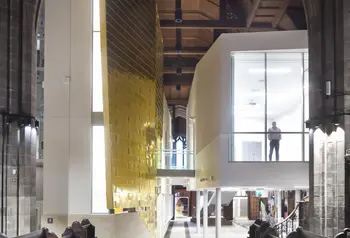Let's celebrate

Following on from the opening of Manchester’s Whitworth Gallery which drew in record crowds over its opening weekend with visitors literally queuing round the block, HLF Chief Executive, Carole Souter, looks at a number of exciting projects already capturing the imagination of thousands of visitors across the UK.
In Manchester, Maria Balshaw’s inspired leadership and vision has taken the Whitworth Gallery to a new point and will I’m sure, see more and more people, from the North West and beyond, visit this amazing place to enjoy both the space itself and its outstanding exhibitions.
Openings are pivotal moments for institutions that have had big building projects. They attract attention and media coverage and provide a brilliant shop window to encourage new visitors. Some people will come for the celebration, drawn by the media hype and then return for the buzz of the place, as much as for the art and artefacts on display. The really important thing is that people – all kinds of people – feel able to come and are welcomed.
HLF has put people at the heart of its funding programmes for many years. We ask for evidence that applicants have talked to their audiences, and reached out to those who don’t see themselves as part of that audience. As the Warwick Commission has pointed out this week, too many people feel that arts, culture and heritage are ‘not for the likes of me’. Lottery funding, coming from National Lottery players, must help change that perception. I believe that we have helped many institutions to move forward – but there is still a long way to go.
Just a few of the openings that have taken place over the past year illustrate what a difference our funding can make. In July, the Black Cultural Archive opened in a listed building in Windrush Square in Brixton, providing a focal point for the local community as well as an invaluable resource for national and international audiences. Just this week, a joint project funded by HLF’s Collecting Cultures programme led to the opening of an exhibition of Black photography at the V&A – with a parallel one running at the BCA itself. Together, this major building project and support for new collections will engage an audience that has not traditionally seen itself properly represented.
In Swansea, meanwhile, the opening of new spaces and exhibitions at the Dylan Thomas Centre in October 2014, in time for the centenary of the poet’s birth brought international support and attention, and hence tourism benefits, but also engaged local groups and schools in a space which offers opportunities to learn and play. The current temporary exhibition showcases the work of young people with special learning needs in animating ‘A Child’s Christmas in Wales’. These young people and their families now know beyond doubt that this centre of excellence is a place for them.
In December last year, a Churches Conservation Trust-led project in Bolton reopened All Souls, at the heart of a residential area with a very different community than when the church first opened for worship. There is an excitement about the place which is fuelled by the modern architecture inside, but based on engagement with, and respect, for its history.
These are all big projects which we expect to have a big impact. More next time on how smaller projects can also transform local communities.
